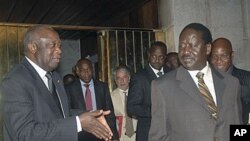Officials at former U.N. Secretary General Kofi Annan's Peacekeeping Training Center say the threat of a West-Africa-led invasion of Ivory Coast is unlikely to materialize and would mostly aggravate the power crisis that has seized the country since the November 28 elections.
"The use of legitimate force," to quote the agreement signed by 15 West African leaders, was supposed to be the last resort the West African bloc would turn to if Ivorian President Laurent Gbagbo did not concede the elections that the African Union says he lost.
But 10 days shy of two months of failed negotiations to pry Gabgbo from power, the threat of a West African invasion of its second-largest economy appears unlikely or, at best, a controversial prospect between the leaders who agreed to it.
Nigerian President Goodluck Jonathan chairs the Economic Community of West African States and has led the bloc's efforts to oust President Gbagbo from power.
If mediation doesn't work, the bloc says it has 6,500 troops on standby, ready to invade and capture Gbagbo. On January 7, though, Ghanaian President John Atta Mills said Ghana would not participate in such an effort.
Ghana has 500 peacekeepers in Ivory Coast. Mills told reporters that sending in a military force would not bring peace to Ivory Coast, and Research Head Kweis Anning at the Kofi Annan Peacekeeping Training Center agrees.
"I think that possibility is fairly weak," said Anning. "If ECOWAS does not use a strike action to extract Gbagbo alone and his henchmen, which even then has very dangerous repercussions later from his supporters, a full-blown intervention force, as we saw in Liberia and Sierra Leone, is at best very far fetched."
Ghana's opposition, regional leaders, and supporters of Ivory Coast's internationally recognized president, Alassane Outtara, have criticized Mills for the decision.
A Burkinabé paper alleged that Mills received campaign contributions from Gbagbo during his own run for office, while an Ivorian newspaper claimed Ghana's main airport is allowing Ivory Coast to park military jets on its tarmac.
A spokesman for Mills' party denied both charges, and Anning said the Ghana president's refusal to participate is consistent with the country's long-standing foreign policy.
"The military intervention option, for me, it is supposed to be used as a stick, to elicit compliance from the Gbagbo camp that, 'Look, if you do not go by the rules and regulations to which you are a signatory to, this option is available,'" said Anning.
If the threat of military intervention is a stick, however, then Senegal's president said the economic community ought to be willing to use it.
In an interview with Bloomberg News last week, President Abdoulaye Wade's spokesman, Pape Dieng, said he is pushing leaders to remove Gbagbo "by any means necessary, even military means." If he does not leave, Dieng said African leaders will think there is never any need to concede an election.




